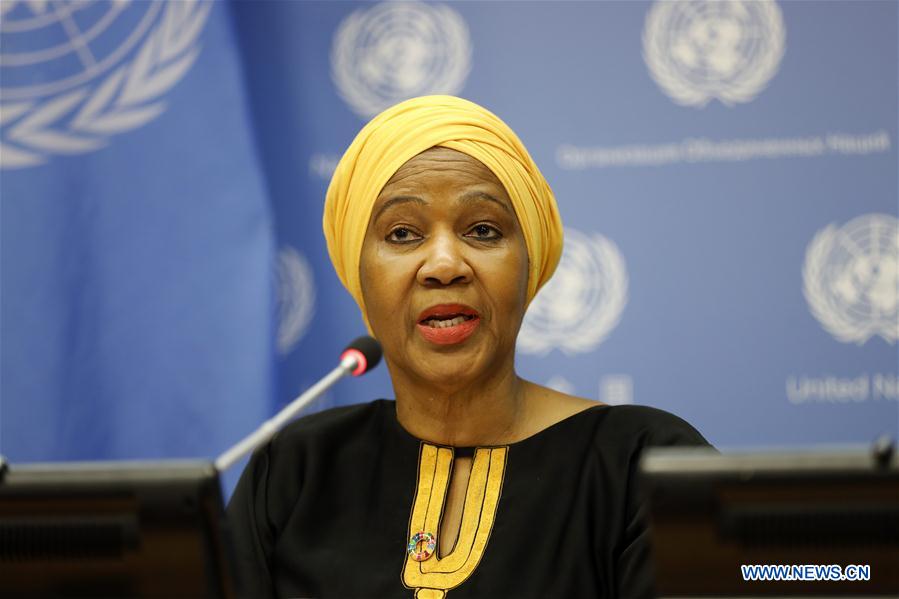
United Nations (UN) Women Executive Director Phumzile Mlambo-Ngcuka speaks during a press briefing at the UN headquarters in New York, March 5, 2020. Since a landmark gender equality plan was declared in 1995, progress has been faltering and hard-won advances are being reversed by rampant inequality, climate change, conflicts and exclusionary politics, a new UN report said Thursday. (Xinhua/Li Muzi)
UNITED NATIONS, March 5 (Xinhua) -- Since a landmark gender equality plan was declared in 1995, progress has been faltering and hard-won advances are being reversed by rampant inequality, climate change, conflicts and exclusionary politics, a new United Nations (UN) report said Thursday.
Marking the 25th anniversary of the adoption of the Beijing Platform for Action, the report titled "Women's Rights in Review, 25 years after Beijing" takes an integrated approach to review progress, gaps, and challenges related to the advancement of gender equality and women's rights.
"The review of women's rights shows that despite some progress, no country has achieved gender equality," said UN Women Executive Director Phumzile Mlambo-Ngcuka.
At a press briefing when launching the report, Mlambo-Ngcuka said globally, 75 percent of lawmakers and parliamentarians are men, 73 percent of managerial positions are held by men, and 70 percent of climate negotiators are also men.
"When it comes to peacemakers, it's even less. Even though we know that when women participate significantly, it also guarantees peace that lasts longer," she said.
Citing the report, UN Women Research and Data Specialist Silke Staab underscored three "concrete examples of areas" where progress is stagnated.
Firstly, there has been very little progress on women's economic empowerment -- represented by the gender gap in labor force participation, which is stagnated over the past 20 years.
"Today, less than two thirds of women are in the labor force as compared to more than 90 percent of men. Meanwhile, of course, women continued to shoulder the bulk of unpaid care and domestic work," she said, adding that a lack of access to affordable childcare services worsens the imparity.
The resulting economic hardship can be profound, she said, as shown in the report, the gender gap in poverty is the widest during key child bearing years.
On a positive note, Latin America has seen women's labor force participation increase over the last 20 years, Staab said, noting countries like Uruguay have boosted childcare coverage because they recognized that women's economic empowerment will become a reality if families make such support.
Secondly, violence against women continues unabated, as nearly one in five women have faced violence by an intimate partner over the past 12 months. "While most countries now have laws against domestic abuse, implementation and enforcement remains weak," she said.
In addition, Staab said new technologies have been fueling new forms of violence, such as cyber harassment, for which policy solutions are largely absent.
Thirdly, despite progress in maternal health, women's sexual and reproductive rights remain far from realized, she said.
The report shows the proportion of women with unmet need for family planning has remained unchanged since 2000. Currently, 190 million women who want to avoid pregnancy lack the means to do so.
Teenage pregnancy has declined, she noted, but it is still a huge issue, especially for poor girls in Latin America and sub-Saharan Africa.
Meanwhile, comprehensive sexuality education and the right of adolescent girls to remain in school when they're pregnant have been challenged, she said.
The report shows sub-Saharan Africa is one of the regions where access to family planning remains woefully inadequate, but it is also home to two of the countries that have made the fastest progress on women's access to contraception, namely Ethiopia and Rwanda.
Staab further called attention to additional challenges that women have faced over the past 25 years.
Conflicts and humanitarian crises since 1995 has become more complex and protracted, leaving women and girls more vulnerable than ever before. The global climate emergency has also been taking a disproportionate toll on the most vulnerable women and girls, who have contributed to the crisis at the minimum level.
Overall, "what is needed now is a concerted drive to scale up, expand and deepen policies and programs that can move the 'needle on women's rights' to the benefit of all," she urged.
Praising surging women's activism across the globe, she said "energized by young feminists at the helm, social movements are challenging piecemeal progress and proposing brave new alternatives."
According to Mlambo-Ngcuka, the UN is set to celebrate the International Women's Day on March 8, with the theme of "Generation Equality: Realizing women's rights."
The UN Women chief said this year also marks the 25th anniversary of the Beijing Platform for Action, the 20th anniversary of UN Security Council resolution 1325 on "Women, Peace and Security," and the 20th birthday of UN Women.



